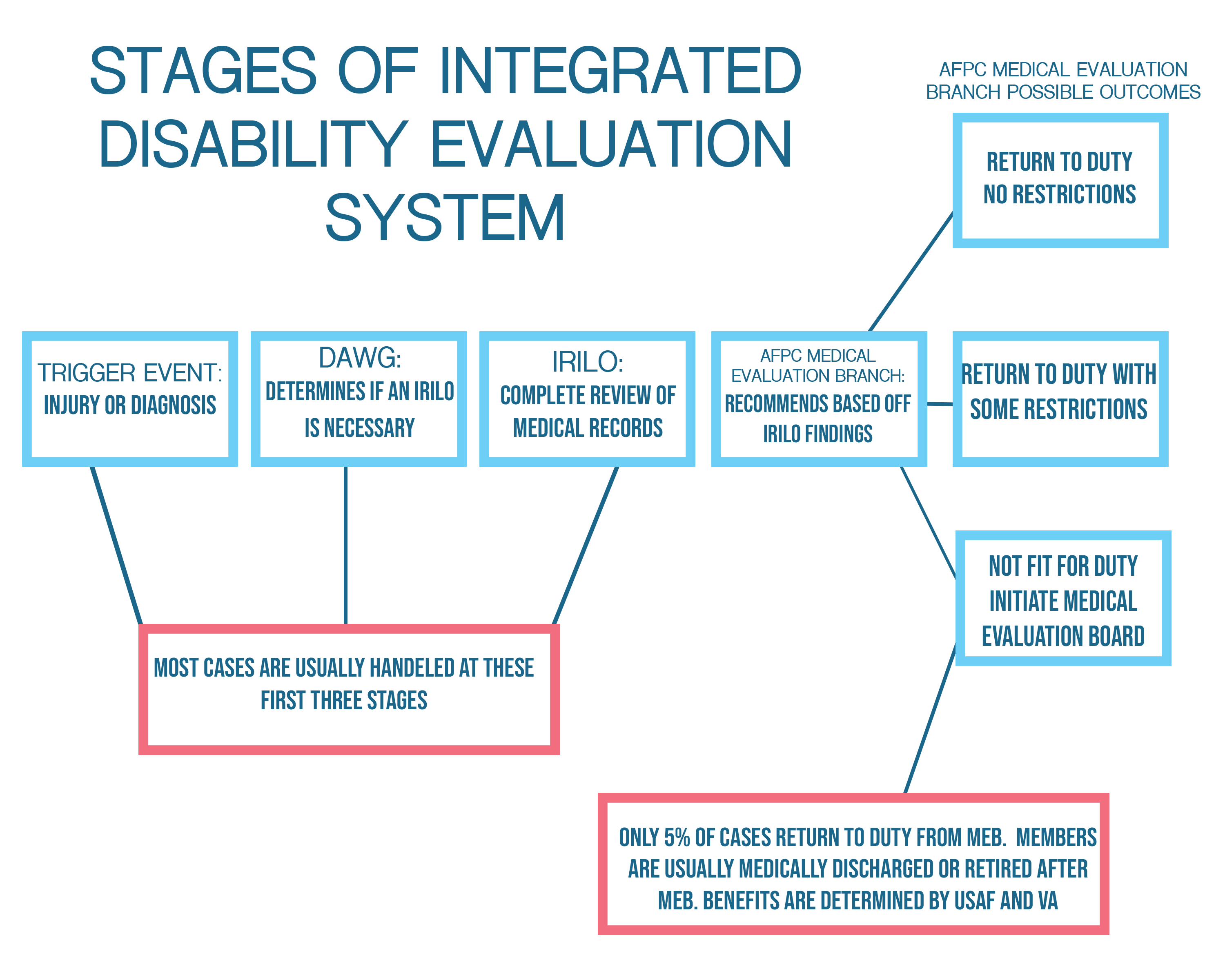WHITEMAN AIR FORCE BASE, Mo. -- A Medical Evaluation Board (MEB) is a reality that any Airman can face at any point during his or her career. An MEB is just one component of an overall system known as the Air Force Integrated Disability Evaluation System (IDES).
IDES is in place to ensure not only a fit force, but the safety and well-being of all members. Navigating through this system can be challenging and stressful at times, but there are a few key points to remember.
There are stages
After an initial injury or diagnosis, an Airman is not automatically subjected to a MEB. After a trigger event, such as an injury or diagnosis of medical condition, the Wing’s Deployment Availability Working Group (DAWG) will gather the information and assess whether or not the case needs to be elevated to the next step, the Initial Review in Lieu of (IRILO).
If the case is recommended by the DAWG for an IRILO, a Physical Evaluation Board Liaison Officer (PEBLO) will contact the Airman and his or her leadership. PEBLOs work to ensure the Airman understands the complete IDES process and the possible outcomes. There are currently two PEBLOs assigned to the 509th Bomb Wing.
After all required information for the IRILO is collected, the member’s case is sent to the Medical Standards Branch. There it will be determined whether or not the member is fit for duty and if they are, what restrictions (if any) will be imposed.
If findings conclude that the Airman is not fit for duty, the MEB will be initiated. According to Staff Sgt. Jaclyn Barile, a PEBLO assigned to the 509th Medical Group, after the case is recommended to MEB, the Airman and their leadership will receive notification that the MEB process has started.
During the MEB it is determined whether or not the individual will be medically discharged or retired. If it is determined the Airman will be discharged or retired, then the Air Force and Veteran’s Affairs will determine the Airman’s ratings which will dictate that Airman’s benefits.

Certain criteria needs to be met for referrals
According to AFPC, there is criteria that needs to be met in order for the case to continue on to a MEB.
1. Medical conditions that prevent an Airman from performing the duties of their office, grade, rank, or rating.
2. Medical conditions that represent an obvious medical risk to the health of the member or safety of other members.
3. Medical conditions that impose unreasonable requirements on the military to maintain or protect an Airman.
In addition to these conditions, Barile clarifies that there is a medical standards directory. “It states all the potentially unfitting conditions that could happen and some which are mandatory to go through the IRILO process.”
“At the end of the day, the Air Force wants to ensure that you can deploy and they want to ensure that if you deploy your medical needs are being met,” added Barile.
It’s stressful
“Honestly, the number one thing every member going through a MEB needs to know is it’s stressful,” said Barile. “You don’t know the fate of your career and you don’t know what’s going to happen.”
While it might be among the most stressful events that can happen in an Airman’s career, there are resources that can help. The main resource for Airmen going through the IDES is the PEBLOs assigned to each base.
“We are here to help. We are very transparent with all of our patients,” affirmed Barile. “We will answer any questions from our members.”
There is a variety of resources available to Airmen at every stage of the process. Whilst going through the process, Airmen can access the base chaplains, Military Family and Life Counselors (MFLCs), and the Airman and Family Readiness Center (A&FRC) to help with the mental, financial, and emotional stressors of the process.
Additionally, Airmen who qualify can reach out to the Wounded Warriors Program, Veterans Affairs and the Air Force Transition Program.

You have rights
According to AFPC, “Airmen have the right to legal advice on their IDES case and legal representation by the Office of Airmen’s Counsel (OAC) at no expense. The OAC consists of attorneys who provide legal services to Airmen who are going through the IDES.”
When a decision is reached during the MEB stage, the Airman can either accept the decision or they have the right to appeal. Their appeal will be sent to the Formal Physical Evaluation Board.
Additionally, those who have 16 years of service, but less than 20, may qualify for Limited Assignment Status.
No two cases are alike
Just because two individuals have the same condition as they go through IDES, does not mean their outcomes will be the same. The IDES evaluates an Airman based on a variety of factors.
Some of these factors can include: years of service, rank, rating, fitness limitations, deployment and assignment requirements, treatment history and prognosis.
“Every single case is different. Every experience is different and every outcome is different,” said Barile.
DES is a last resort
According to AFPC, most cases are handled at the DAWG or IRILO levels and never reach the point of a MEB.
Members can rest assured that if their case is referred to MEB it is after their medical team has exhausted every resource and treatment to reach a maximum medical outcome.
